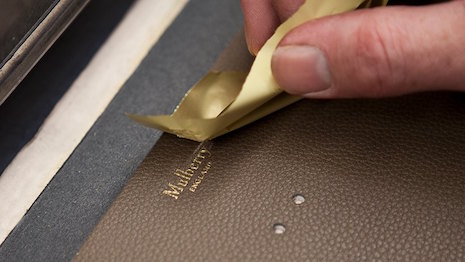 Burberry February 2017 collection featured in British Vogue The 100; photo by Philip Sinden
Burberry February 2017 collection featured in British Vogue The 100; photo by Philip Sinden The British Fashion Council has set out to advocate and safeguard United Kingdom-based craftsmanship through the launch of a manufacturers database.
The British High-End Manufacturers Database was created in direct response to the BFC’s “2015 High-End and Designer Manufacturing Report,” conducted by Glasgow Caledonian University and Oxford University, which found the fashion sector was in need of an audited database of U.K. talent. In recent months, there has been an emphasis on British craft and artisanal talents with events, editorial and branded initiatives showing off the U.K.’s pride in best-made goods.
"The rise of fast fashion has had a pernicious impact on high-end manufacturers. These are businesses that supply high-quality raw materials or detail components (i.e. buttons) to designers," said Thomaï Serdari, Ph.D., founder of PIQLuxury, co-editor of Luxury: History Culture Consumption and adjunct professor of luxury marketing at New York University, New York. "While the production standards are elevated, the turnaround time of orders is usually longer. As small and medium size enterprises (SME), these type of businesses are more often than not financially encumbered, an issue that further limits their ability to market their product and expertise and position themselves in front of designers and brands.
"Yet, they are specialists of the highest caliber and custodians of vernacular types of craftsmanship that would otherwise have been lost. While a lot of designers/brands have turned oversees for sourcing (new synthetic materials; quick order turnaround; better bulk pricing) and domestic manufacturers' revenues have decreased, the passion for excellence is what keeps these businesses going," she said.
"This initiative presents a wonderful opportunity for designers to rethink which orders get sourced abroad and why (how does this serve their design and message) and for manufacturers to make themselves known to a younger community of professionals who are very interested in 'slowing' the pace of fashion and reconnecting with crafts that once formed the backbone of British industrialization (as was the case with the button, lace, and textile industries for example).
"The initiative simply means greater business opportunities for high-quality manufacturers and greater creative potential for designers. It is a win-win proposition with great revenues potential for both parties."
Ms. Serdari is not affiliated with the BFC, but agreed to comment as an industry expert. The BFC was reached for comment.
Made in the UK
Through the use of the British High-End Manufacturers Database, talents in different fields, from tweed textiles and lace mills to leather tanneries and embroidery, will be easily put in touch with designers. The database will work to streamline supply chain relationships and make the production process more efficient for U.K. designers.
The free-use database will live within the BFC Designer Fact File, an educational platform created to provide designer businesses with training on a spectrum of relevant topics.
The Designer Fact File’s topics are tailored for all levels of businesses, from start-ups to established brands. Content has been provided by industry professionals.
Talent listed in the first stage of the British High-End Manufacturers Database has been sourced by designer recommendations along with findings from the High-End and Designer Manufacturing Report.
Professor Christopher Moore, director of the British School of Fashion, Glasgow Caledonian University and Caroline Rush CBE, CEO of the British Fashion Council launched the British High-End Manufacturers Database
Stage two will see the database rounded out organically with additional designer and BFC recommendations. Future manufacturer audits, orchestrated by the BFC, will be conducted to keep the database fluid.
Manufacturers and suppliers are also encouraged to submit themselves for listing within the database.
"The database will both streamline and expand the creation process. On the one hand, sourcing will become so much more efficient. One can quickly browse the list of manufacturers to identify the type of material needed and to even compare competing business in terms of quality, costs, delivery time, etc.," PIQLuxury's Ms. Serdari said.
"This is how the creative process becomes efficient and circumvents bottlenecks of hours and hours of stalled research," she said. "On the other hand, the availability of so many artisanal businesses and the direct exposure to the designers' studios will undoubtedly influence how designers think about their final products. Lack of options imposes design rigidity. More options free the mind.
"Additionally, easy access infuses the creative process with new potential for it to grow in new directions. The British fashion industry is well known for its highly creative character, much more than French or American fashion, and this 'coming home to roost' initiative will allow it to develop in an even more pronounced singular way.
"We should expect heightened creativity and individuality to flourish in the British context, a welcome diversion from the somewhat flat, yet efficient, character of global fashion brands," she said.
The British High-End Manufacturers Database is the first 2017 launch within the the BFC’s Positive Fashion initiative.
Through its Positive Fashion initiative the BFC hopes to prioritize sustainability and ethical practices in the fashion industry. The three key focuses of Positive Fashion are sustainability, diversity and industry education, which includes model health and wellness, and local manufacturing and craftsmanship.
For the love of craft
Being defined as “made in the U.K.” is an instinct element of many British heritage brands. In the aftermath of Brexit, British brands have set forth to share positive culture by emphasizing their passion and skills as a way to safeguard artisanship amidst trying social and political times.
Now in its third year, London Craft Week is continuing to advocate for traditional artisan skills such as tailoring, book binding and woodworking.
Held on May 3-7 the week-long showcase will feature craftsmanship from around the world and a program of more than 200 events across London. Attendees will be welcomed into hidden workshops of unknown makers along with famous studios, shops and luxury brands to learn of their inner workings and creative process.
With countless luxury brands relying on craftsmanship and quality as marketing tools, a week-long showcase of skill and importance may sway consumers who were unsure if the products justify the price.
Mulberry is a sponsor of London Craft Week
During London Craft Week, attendees partake in demonstrations, exhibitions, seminars, tours, films and dinners (see story).
Also, Condé Nast-owned British Vogue has dedicated its April edition to the craftsmanship that hails from the British Isles.
British Vogue’s editorial direction for April was done in response to Britain being “at the heart of the current news agenda and political debate.”
Instead of focusing on divisive topics, British Vogue set out to underscore the creative and inspiring design talents that call the British Isles home.
April’s “The 100” is a celebration of the biggest, brightest and finest British brands. The listorial ranges from heritage houses synonymous with British luxury to new, rising talents and smaller, but well-targeted brands.
The 100 is broken into 17 categories, giving readers a well-rounded overview of Britain’s creative talents both big and small (see story).
For smaller, lesser-known craftsmen, with limited reach and distribution, the database of talent may help spur new relationships and client collaborations.
"Collaboration between young artisans with limited financial means and smaller houses with smaller volume targets will foster an environment of trust, appreciation and economic development domestically," PIQLuxury's Ms. Serdari said. "The database is practically a marketing tool for young artisans who have not developed client lists long enough yet to sustain their business.
"Similarly, smaller fashion houses that don't have the order volume to secure a place in larger manufacturers' production schedule will gain easier access to available talent and facilities and will be able to fulfill their orders much more quickly," she said. "It is a match that enables both parties to bring in new business and to deliver high-quality work on time. Matchmaking at its best."

